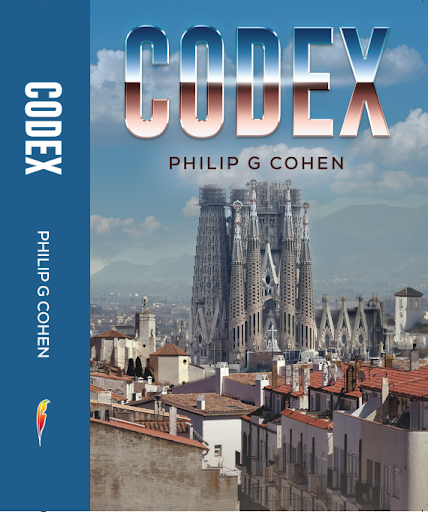In an era brimming with genre-bending fiction, Philip G. Cohen’s forthcoming novel, Codex—slated for release on August 15, 2025—stands out as a refreshingly complex and intellectually daring entry.
More than just a mystery, Codex is a postmodern epic that layers satire, speculative science, historical reinterpretation, and philosophical critique within the deceptively tranquil coastal village of Cadaqués, Spanish Catalonia.
At its heart, Codex is a mystery that resists easy classification. We’re introduced to Xavier de Torrent de Tête, the “Librarian of Lost Books”—a polymath whose claim to fame is solving the infamous “Hieroglyphics Homicides.” This achievement elevates him from an obscure academic to a public intellectual.
From the outset, Cohen signals a departure from traditional mystery conventions. The Hieroglyphics Homicides case is a masterclass in layered deception, with its perpetrator, Dr. Byblos Younis—an expert in mummification—ironically consulting the police on his own crimes. This self-referential twist is quintessentially postmodern: a detective story where the boundary between hunter and hunted dissolves into playful ambiguity.
The setting amplifies this aesthetic. Cadaqués, memorably described by Salvador Dalí as a “mad geological delirium,” is far more than a scenic backdrop. Here, “the Pyrenees tumble into the sea,” and the village itself breathes with history, mystery, and myth.
Cohen treats place as character, an unstable, almost sentient terrain where ancient secrets simmer beneath modern calm. It’s a locale alive with tension between surface serenity and subterranean upheaval, both geological and historical.
But what truly distinguishes Codex is its fearless fusion of fact, myth, and speculative fiction. When a mummified knight is discovered inside a volcanic cone, clutching an “armoured egg” containing ancient scrolls, the novel launches into an ambitious, millennia-spanning odyssey. These artifacts aren’t just plot devices—they’re vessels through which Cohen dismantles and reassembles dominant historical narratives.
Take the Second Scroll: a subversive retelling of the Passion in which Jesus is flayed before crucifixion. Far from sensationalism, the reinterpretation is rooted in scholarly rigour and filtered through Xavier’s collaboration with his daughter, September Eleven. Their “translations” straddle archaeology, linguistics, and satire, inviting readers to reconsider the construction of sacred truth.
The Third Scroll pushes boundaries further. Allegedly made of human skin—possibly Christ’s—it features disappearing, shield-like markings that turn out to be the coats of arms of the Grand Masters of Malta. The scroll’s shifting nature blurs the lines between miracle, anomaly, and fabrication, ushering the reader into a world where reality is perpetually re-coded.
This ambiguity extends to the novel’s antagonists: the Knights of the New Order, a quasi-religious sect with a tenuous link to the Templars. Their aim? To enable the Second Coming through science, namely, human cloning. Here, Cohen deftly satirizes both religious dogma and techno-utopianism, posing provocative questions about agency, belief, and the ethical limits of human intervention in the divine.
Yet for all its philosophical heft, Codex never loses its sense of humor or humanity. Characters like Eugeni Joel Duràn Martinez, a shady property developer, and Hortensia, the unlikely surrogate for a cloned Christ, bring raw satire and dark comedy to the forefront. Eugeni’s corrupt ventures and his wife Nieves’s increasingly absurd fertility treatments inject moments of absurdity that balance the novel’s weightier themes. September Eleven’s irreverent commentary, meanwhile, offers a much-needed meta-voice, keeping the narrative buoyant with sharp wit and cultural critique.
Cohen skewers everything from bureaucratic inefficiency to “woke” consumerism, spiritual commodification, and the cult of self-optimization. The result is a novel that doesn’t just entertain—it dissects, deconstructs, and provokes. In the end, Codex is an experience. Bold in scope and audacious in execution, it invites readers to traverse a layered terrain of myth, memory, and possibility. With its intricate plotting, philosophical depth, and satirical bite, Codex promises to be one of the most original and challenging works of fiction in recent memory—a postmodern mystery well worth the wait.
 WhatsApp Us Now
WhatsApp Us Now







